Review of Current Accounting Issues: Financial Reporting and Ethics
VerifiedAdded on 2021/06/16
|13
|3508
|58
Report
AI Summary
This report provides a detailed review of current accounting issues, primarily focusing on ethical breaches within the accounting profession and the implications for financial reporting. The analysis begins with a discussion of the KPMG scandal, highlighting the detrimental effects of unethical practices and the importance of maintaining integrity in financial reporting. The report then explores the responsibilities of organizations and accountants to stakeholders, emphasizing the need for accurate and transparent financial information. It also delves into the importance of ethical accounting practices, the role of Generally Accepted Accounting Principles (GAAP), and the fundamental principles of professional conduct. Furthermore, the report examines the International Accounting Standards Board's (IASB) proposals for amending accounting standards related to errors, estimates, and policies, including the application of IAS 8 and the implications of voluntary changes. The report concludes by emphasizing the importance of ethical behavior and adherence to accounting standards to maintain trust and ensure the reliability of financial information.
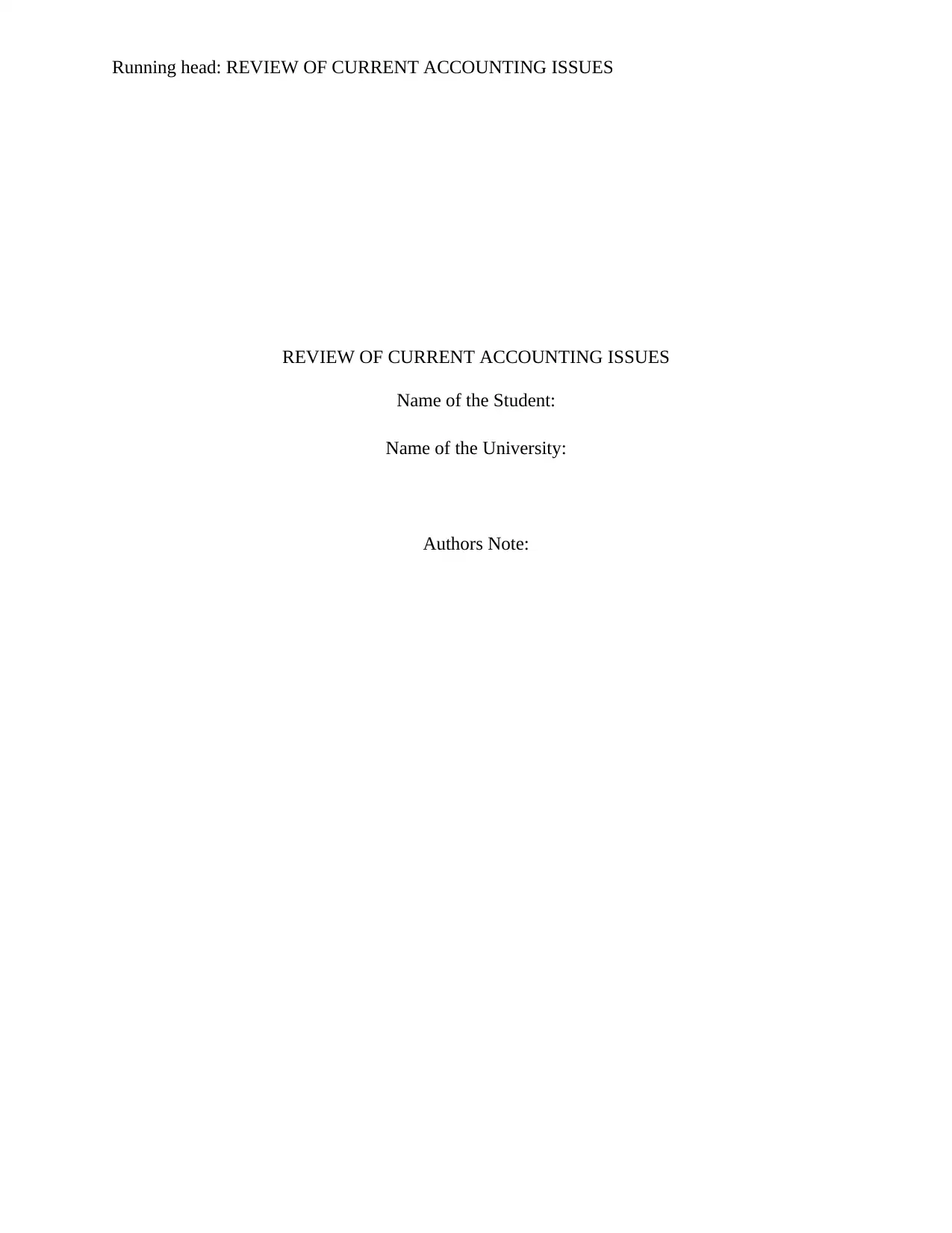
Running head: REVIEW OF CURRENT ACCOUNTING ISSUES
REVIEW OF CURRENT ACCOUNTING ISSUES
Name of the Student:
Name of the University:
Authors Note:
REVIEW OF CURRENT ACCOUNTING ISSUES
Name of the Student:
Name of the University:
Authors Note:
Paraphrase This Document
Need a fresh take? Get an instant paraphrase of this document with our AI Paraphraser
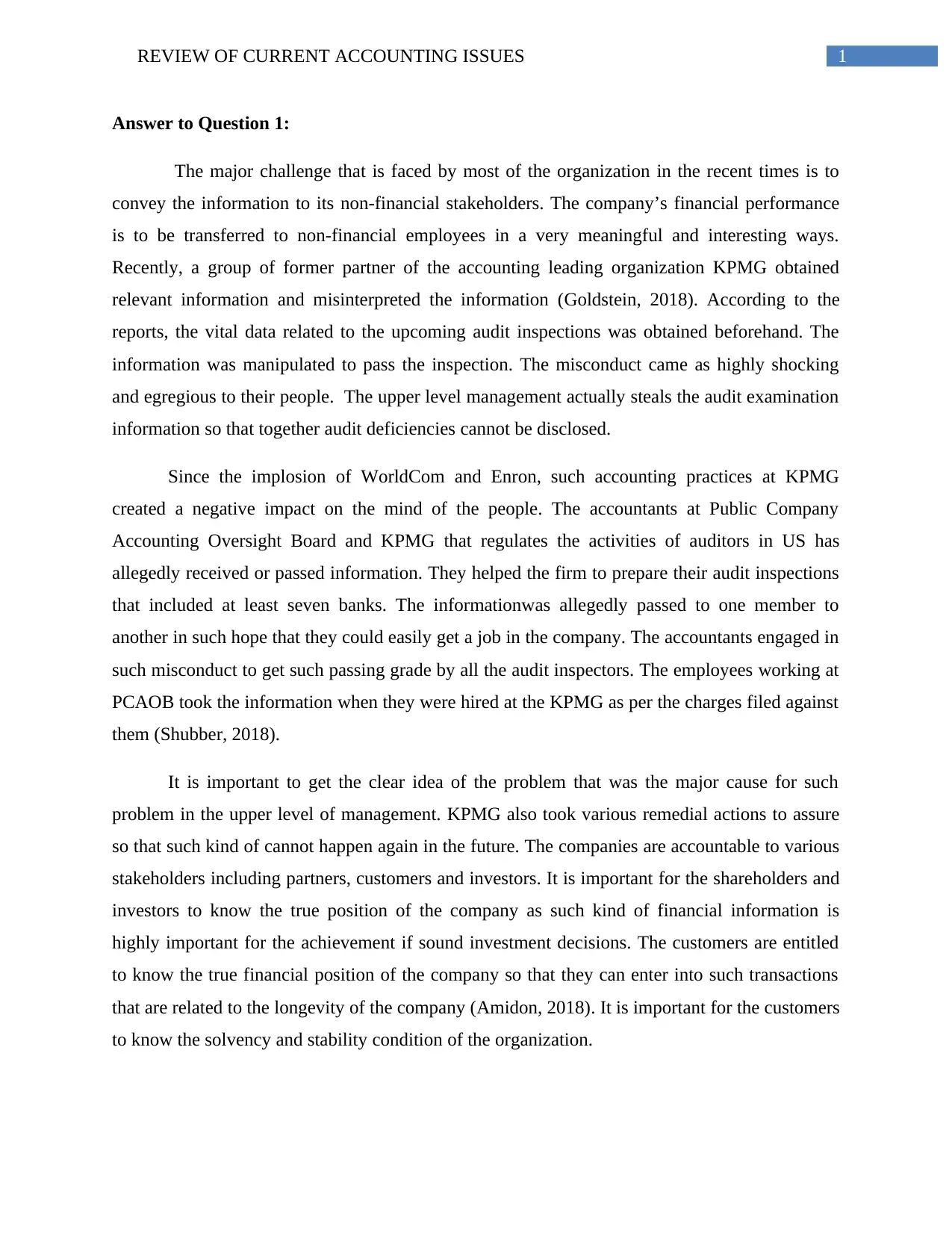
1REVIEW OF CURRENT ACCOUNTING ISSUES
Answer to Question 1:
The major challenge that is faced by most of the organization in the recent times is to
convey the information to its non-financial stakeholders. The company’s financial performance
is to be transferred to non-financial employees in a very meaningful and interesting ways.
Recently, a group of former partner of the accounting leading organization KPMG obtained
relevant information and misinterpreted the information (Goldstein, 2018). According to the
reports, the vital data related to the upcoming audit inspections was obtained beforehand. The
information was manipulated to pass the inspection. The misconduct came as highly shocking
and egregious to their people. The upper level management actually steals the audit examination
information so that together audit deficiencies cannot be disclosed.
Since the implosion of WorldCom and Enron, such accounting practices at KPMG
created a negative impact on the mind of the people. The accountants at Public Company
Accounting Oversight Board and KPMG that regulates the activities of auditors in US has
allegedly received or passed information. They helped the firm to prepare their audit inspections
that included at least seven banks. The informationwas allegedly passed to one member to
another in such hope that they could easily get a job in the company. The accountants engaged in
such misconduct to get such passing grade by all the audit inspectors. The employees working at
PCAOB took the information when they were hired at the KPMG as per the charges filed against
them (Shubber, 2018).
It is important to get the clear idea of the problem that was the major cause for such
problem in the upper level of management. KPMG also took various remedial actions to assure
so that such kind of cannot happen again in the future. The companies are accountable to various
stakeholders including partners, customers and investors. It is important for the shareholders and
investors to know the true position of the company as such kind of financial information is
highly important for the achievement if sound investment decisions. The customers are entitled
to know the true financial position of the company so that they can enter into such transactions
that are related to the longevity of the company (Amidon, 2018). It is important for the customers
to know the solvency and stability condition of the organization.
Answer to Question 1:
The major challenge that is faced by most of the organization in the recent times is to
convey the information to its non-financial stakeholders. The company’s financial performance
is to be transferred to non-financial employees in a very meaningful and interesting ways.
Recently, a group of former partner of the accounting leading organization KPMG obtained
relevant information and misinterpreted the information (Goldstein, 2018). According to the
reports, the vital data related to the upcoming audit inspections was obtained beforehand. The
information was manipulated to pass the inspection. The misconduct came as highly shocking
and egregious to their people. The upper level management actually steals the audit examination
information so that together audit deficiencies cannot be disclosed.
Since the implosion of WorldCom and Enron, such accounting practices at KPMG
created a negative impact on the mind of the people. The accountants at Public Company
Accounting Oversight Board and KPMG that regulates the activities of auditors in US has
allegedly received or passed information. They helped the firm to prepare their audit inspections
that included at least seven banks. The informationwas allegedly passed to one member to
another in such hope that they could easily get a job in the company. The accountants engaged in
such misconduct to get such passing grade by all the audit inspectors. The employees working at
PCAOB took the information when they were hired at the KPMG as per the charges filed against
them (Shubber, 2018).
It is important to get the clear idea of the problem that was the major cause for such
problem in the upper level of management. KPMG also took various remedial actions to assure
so that such kind of cannot happen again in the future. The companies are accountable to various
stakeholders including partners, customers and investors. It is important for the shareholders and
investors to know the true position of the company as such kind of financial information is
highly important for the achievement if sound investment decisions. The customers are entitled
to know the true financial position of the company so that they can enter into such transactions
that are related to the longevity of the company (Amidon, 2018). It is important for the customers
to know the solvency and stability condition of the organization.
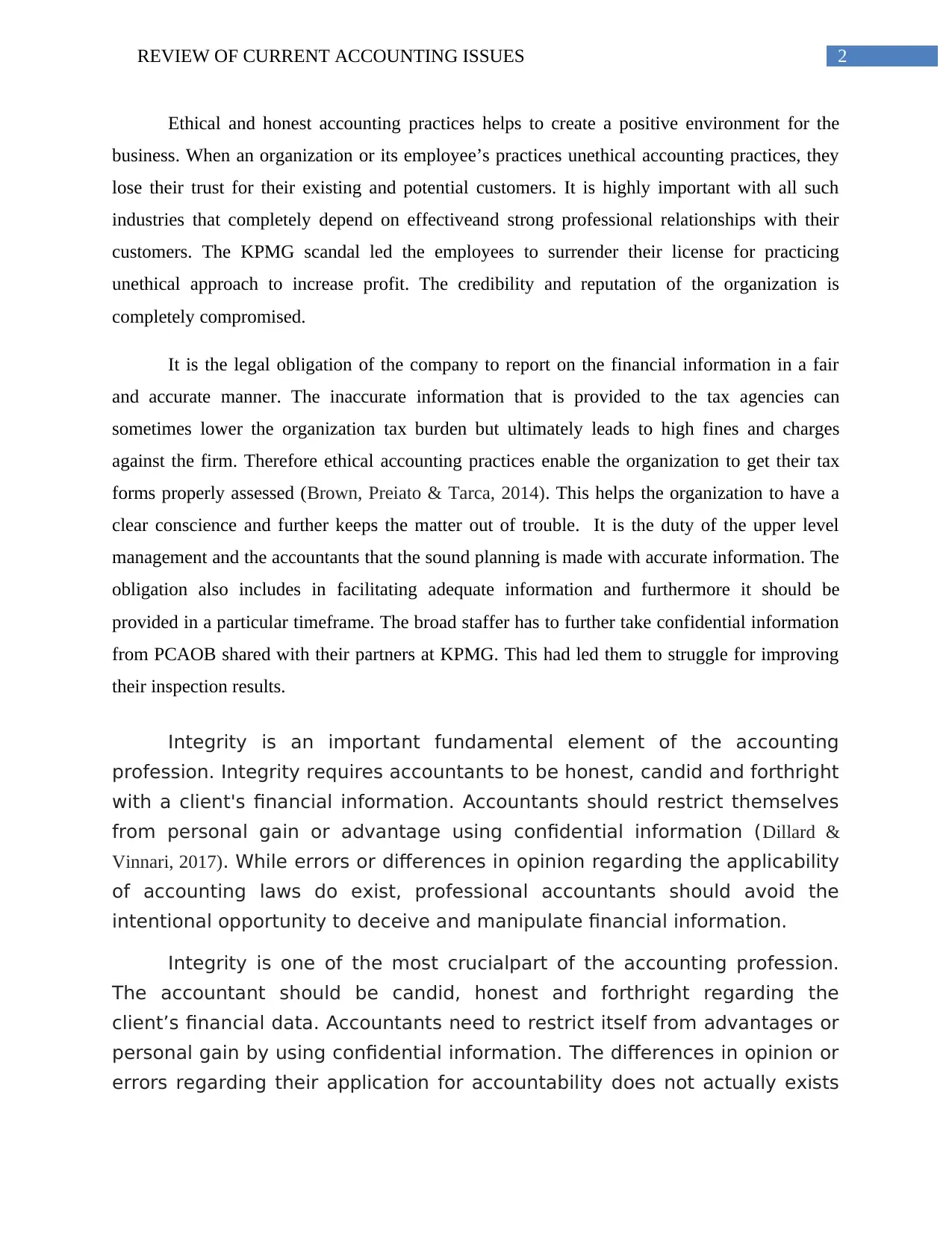
2REVIEW OF CURRENT ACCOUNTING ISSUES
Ethical and honest accounting practices helps to create a positive environment for the
business. When an organization or its employee’s practices unethical accounting practices, they
lose their trust for their existing and potential customers. It is highly important with all such
industries that completely depend on effectiveand strong professional relationships with their
customers. The KPMG scandal led the employees to surrender their license for practicing
unethical approach to increase profit. The credibility and reputation of the organization is
completely compromised.
It is the legal obligation of the company to report on the financial information in a fair
and accurate manner. The inaccurate information that is provided to the tax agencies can
sometimes lower the organization tax burden but ultimately leads to high fines and charges
against the firm. Therefore ethical accounting practices enable the organization to get their tax
forms properly assessed (Brown, Preiato & Tarca, 2014). This helps the organization to have a
clear conscience and further keeps the matter out of trouble. It is the duty of the upper level
management and the accountants that the sound planning is made with accurate information. The
obligation also includes in facilitating adequate information and furthermore it should be
provided in a particular timeframe. The broad staffer has to further take confidential information
from PCAOB shared with their partners at KPMG. This had led them to struggle for improving
their inspection results.
Integrity is an important fundamental element of the accounting
profession. Integrity requires accountants to be honest, candid and forthright
with a client's financial information. Accountants should restrict themselves
from personal gain or advantage using confidential information (Dillard &
Vinnari, 2017). While errors or differences in opinion regarding the applicability
of accounting laws do exist, professional accountants should avoid the
intentional opportunity to deceive and manipulate financial information.
Integrity is one of the most crucialpart of the accounting profession.
The accountant should be candid, honest and forthright regarding the
client’s financial data. Accountants need to restrict itself from advantages or
personal gain by using confidential information. The differences in opinion or
errors regarding their application for accountability does not actually exists
Ethical and honest accounting practices helps to create a positive environment for the
business. When an organization or its employee’s practices unethical accounting practices, they
lose their trust for their existing and potential customers. It is highly important with all such
industries that completely depend on effectiveand strong professional relationships with their
customers. The KPMG scandal led the employees to surrender their license for practicing
unethical approach to increase profit. The credibility and reputation of the organization is
completely compromised.
It is the legal obligation of the company to report on the financial information in a fair
and accurate manner. The inaccurate information that is provided to the tax agencies can
sometimes lower the organization tax burden but ultimately leads to high fines and charges
against the firm. Therefore ethical accounting practices enable the organization to get their tax
forms properly assessed (Brown, Preiato & Tarca, 2014). This helps the organization to have a
clear conscience and further keeps the matter out of trouble. It is the duty of the upper level
management and the accountants that the sound planning is made with accurate information. The
obligation also includes in facilitating adequate information and furthermore it should be
provided in a particular timeframe. The broad staffer has to further take confidential information
from PCAOB shared with their partners at KPMG. This had led them to struggle for improving
their inspection results.
Integrity is an important fundamental element of the accounting
profession. Integrity requires accountants to be honest, candid and forthright
with a client's financial information. Accountants should restrict themselves
from personal gain or advantage using confidential information (Dillard &
Vinnari, 2017). While errors or differences in opinion regarding the applicability
of accounting laws do exist, professional accountants should avoid the
intentional opportunity to deceive and manipulate financial information.
Integrity is one of the most crucialpart of the accounting profession.
The accountant should be candid, honest and forthright regarding the
client’s financial data. Accountants need to restrict itself from advantages or
personal gain by using confidential information. The differences in opinion or
errors regarding their application for accountability does not actually exists
⊘ This is a preview!⊘
Do you want full access?
Subscribe today to unlock all pages.

Trusted by 1+ million students worldwide
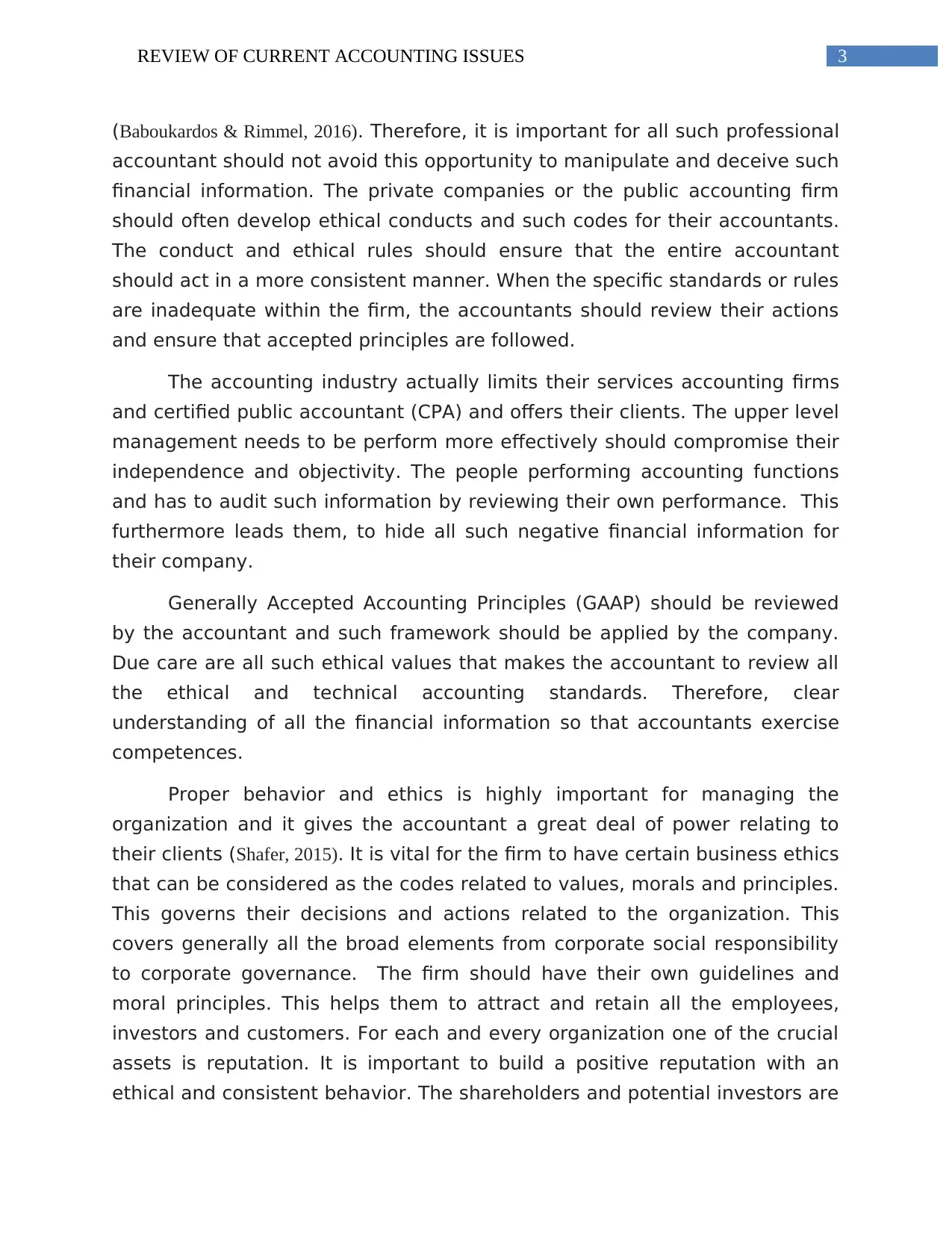
3REVIEW OF CURRENT ACCOUNTING ISSUES
(Baboukardos & Rimmel, 2016). Therefore, it is important for all such professional
accountant should not avoid this opportunity to manipulate and deceive such
financial information. The private companies or the public accounting firm
should often develop ethical conducts and such codes for their accountants.
The conduct and ethical rules should ensure that the entire accountant
should act in a more consistent manner. When the specific standards or rules
are inadequate within the firm, the accountants should review their actions
and ensure that accepted principles are followed.
The accounting industry actually limits their services accounting firms
and certified public accountant (CPA) and offers their clients. The upper level
management needs to be perform more effectively should compromise their
independence and objectivity. The people performing accounting functions
and has to audit such information by reviewing their own performance. This
furthermore leads them, to hide all such negative financial information for
their company.
Generally Accepted Accounting Principles (GAAP) should be reviewed
by the accountant and such framework should be applied by the company.
Due care are all such ethical values that makes the accountant to review all
the ethical and technical accounting standards. Therefore, clear
understanding of all the financial information so that accountants exercise
competences.
Proper behavior and ethics is highly important for managing the
organization and it gives the accountant a great deal of power relating to
their clients (Shafer, 2015). It is vital for the firm to have certain business ethics
that can be considered as the codes related to values, morals and principles.
This governs their decisions and actions related to the organization. This
covers generally all the broad elements from corporate social responsibility
to corporate governance. The firm should have their own guidelines and
moral principles. This helps them to attract and retain all the employees,
investors and customers. For each and every organization one of the crucial
assets is reputation. It is important to build a positive reputation with an
ethical and consistent behavior. The shareholders and potential investors are
(Baboukardos & Rimmel, 2016). Therefore, it is important for all such professional
accountant should not avoid this opportunity to manipulate and deceive such
financial information. The private companies or the public accounting firm
should often develop ethical conducts and such codes for their accountants.
The conduct and ethical rules should ensure that the entire accountant
should act in a more consistent manner. When the specific standards or rules
are inadequate within the firm, the accountants should review their actions
and ensure that accepted principles are followed.
The accounting industry actually limits their services accounting firms
and certified public accountant (CPA) and offers their clients. The upper level
management needs to be perform more effectively should compromise their
independence and objectivity. The people performing accounting functions
and has to audit such information by reviewing their own performance. This
furthermore leads them, to hide all such negative financial information for
their company.
Generally Accepted Accounting Principles (GAAP) should be reviewed
by the accountant and such framework should be applied by the company.
Due care are all such ethical values that makes the accountant to review all
the ethical and technical accounting standards. Therefore, clear
understanding of all the financial information so that accountants exercise
competences.
Proper behavior and ethics is highly important for managing the
organization and it gives the accountant a great deal of power relating to
their clients (Shafer, 2015). It is vital for the firm to have certain business ethics
that can be considered as the codes related to values, morals and principles.
This governs their decisions and actions related to the organization. This
covers generally all the broad elements from corporate social responsibility
to corporate governance. The firm should have their own guidelines and
moral principles. This helps them to attract and retain all the employees,
investors and customers. For each and every organization one of the crucial
assets is reputation. It is important to build a positive reputation with an
ethical and consistent behavior. The shareholders and potential investors are
Paraphrase This Document
Need a fresh take? Get an instant paraphrase of this document with our AI Paraphraser
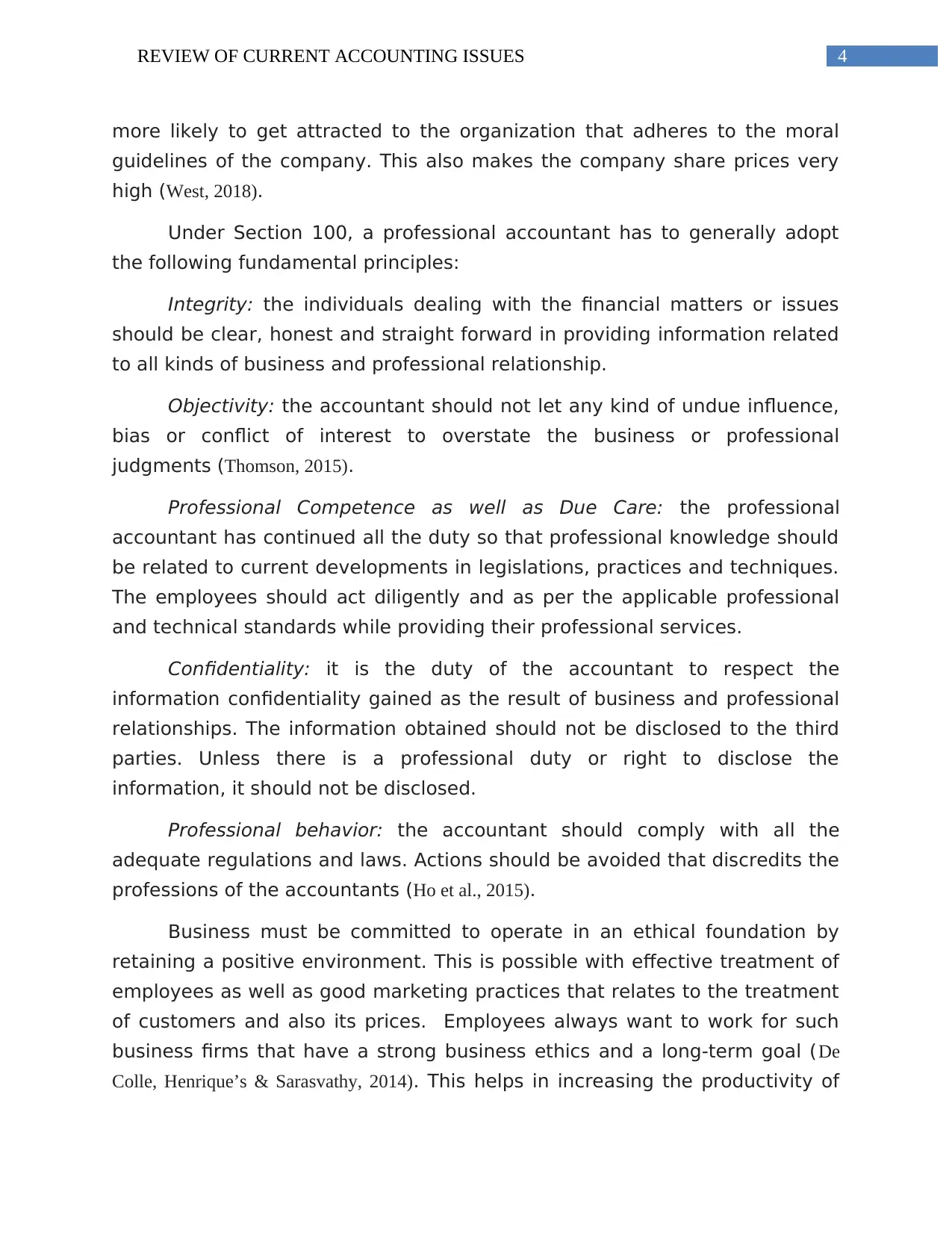
4REVIEW OF CURRENT ACCOUNTING ISSUES
more likely to get attracted to the organization that adheres to the moral
guidelines of the company. This also makes the company share prices very
high (West, 2018).
Under Section 100, a professional accountant has to generally adopt
the following fundamental principles:
Integrity: the individuals dealing with the financial matters or issues
should be clear, honest and straight forward in providing information related
to all kinds of business and professional relationship.
Objectivity: the accountant should not let any kind of undue influence,
bias or conflict of interest to overstate the business or professional
judgments (Thomson, 2015).
Professional Competence as well as Due Care: the professional
accountant has continued all the duty so that professional knowledge should
be related to current developments in legislations, practices and techniques.
The employees should act diligently and as per the applicable professional
and technical standards while providing their professional services.
Confidentiality: it is the duty of the accountant to respect the
information confidentiality gained as the result of business and professional
relationships. The information obtained should not be disclosed to the third
parties. Unless there is a professional duty or right to disclose the
information, it should not be disclosed.
Professional behavior: the accountant should comply with all the
adequate regulations and laws. Actions should be avoided that discredits the
professions of the accountants (Ho et al., 2015).
Business must be committed to operate in an ethical foundation by
retaining a positive environment. This is possible with effective treatment of
employees as well as good marketing practices that relates to the treatment
of customers and also its prices. Employees always want to work for such
business firms that have a strong business ethics and a long-term goal (De
Colle, Henrique’s & Sarasvathy, 2014). This helps in increasing the productivity of
more likely to get attracted to the organization that adheres to the moral
guidelines of the company. This also makes the company share prices very
high (West, 2018).
Under Section 100, a professional accountant has to generally adopt
the following fundamental principles:
Integrity: the individuals dealing with the financial matters or issues
should be clear, honest and straight forward in providing information related
to all kinds of business and professional relationship.
Objectivity: the accountant should not let any kind of undue influence,
bias or conflict of interest to overstate the business or professional
judgments (Thomson, 2015).
Professional Competence as well as Due Care: the professional
accountant has continued all the duty so that professional knowledge should
be related to current developments in legislations, practices and techniques.
The employees should act diligently and as per the applicable professional
and technical standards while providing their professional services.
Confidentiality: it is the duty of the accountant to respect the
information confidentiality gained as the result of business and professional
relationships. The information obtained should not be disclosed to the third
parties. Unless there is a professional duty or right to disclose the
information, it should not be disclosed.
Professional behavior: the accountant should comply with all the
adequate regulations and laws. Actions should be avoided that discredits the
professions of the accountants (Ho et al., 2015).
Business must be committed to operate in an ethical foundation by
retaining a positive environment. This is possible with effective treatment of
employees as well as good marketing practices that relates to the treatment
of customers and also its prices. Employees always want to work for such
business firms that have a strong business ethics and a long-term goal (De
Colle, Henrique’s & Sarasvathy, 2014). This helps in increasing the productivity of
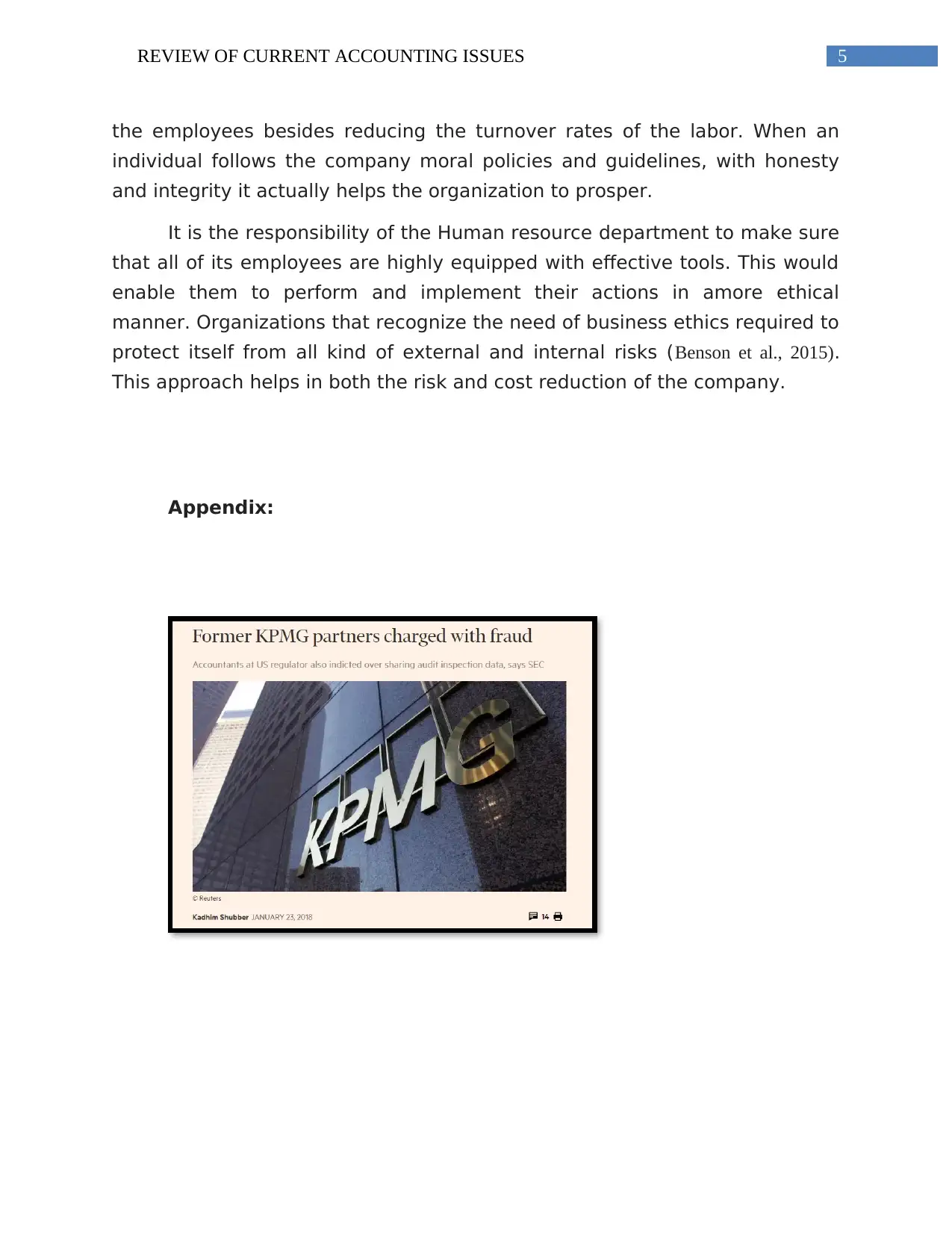
5REVIEW OF CURRENT ACCOUNTING ISSUES
the employees besides reducing the turnover rates of the labor. When an
individual follows the company moral policies and guidelines, with honesty
and integrity it actually helps the organization to prosper.
It is the responsibility of the Human resource department to make sure
that all of its employees are highly equipped with effective tools. This would
enable them to perform and implement their actions in amore ethical
manner. Organizations that recognize the need of business ethics required to
protect itself from all kind of external and internal risks (Benson et al., 2015).
This approach helps in both the risk and cost reduction of the company.
Appendix:
the employees besides reducing the turnover rates of the labor. When an
individual follows the company moral policies and guidelines, with honesty
and integrity it actually helps the organization to prosper.
It is the responsibility of the Human resource department to make sure
that all of its employees are highly equipped with effective tools. This would
enable them to perform and implement their actions in amore ethical
manner. Organizations that recognize the need of business ethics required to
protect itself from all kind of external and internal risks (Benson et al., 2015).
This approach helps in both the risk and cost reduction of the company.
Appendix:
⊘ This is a preview!⊘
Do you want full access?
Subscribe today to unlock all pages.

Trusted by 1+ million students worldwide
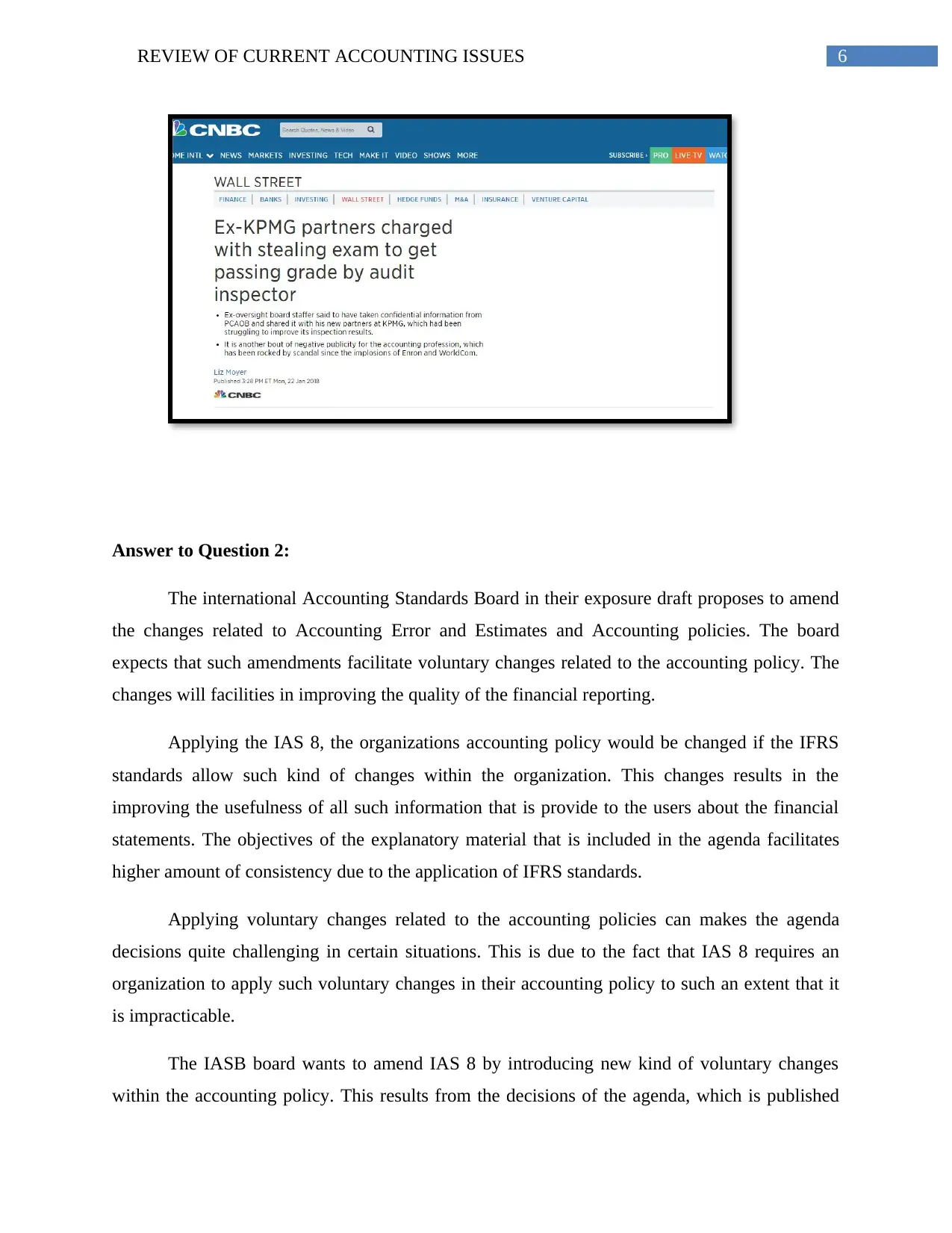
6REVIEW OF CURRENT ACCOUNTING ISSUES
Answer to Question 2:
The international Accounting Standards Board in their exposure draft proposes to amend
the changes related to Accounting Error and Estimates and Accounting policies. The board
expects that such amendments facilitate voluntary changes related to the accounting policy. The
changes will facilities in improving the quality of the financial reporting.
Applying the IAS 8, the organizations accounting policy would be changed if the IFRS
standards allow such kind of changes within the organization. This changes results in the
improving the usefulness of all such information that is provide to the users about the financial
statements. The objectives of the explanatory material that is included in the agenda facilitates
higher amount of consistency due to the application of IFRS standards.
Applying voluntary changes related to the accounting policies can makes the agenda
decisions quite challenging in certain situations. This is due to the fact that IAS 8 requires an
organization to apply such voluntary changes in their accounting policy to such an extent that it
is impracticable.
The IASB board wants to amend IAS 8 by introducing new kind of voluntary changes
within the accounting policy. This results from the decisions of the agenda, which is published
Answer to Question 2:
The international Accounting Standards Board in their exposure draft proposes to amend
the changes related to Accounting Error and Estimates and Accounting policies. The board
expects that such amendments facilitate voluntary changes related to the accounting policy. The
changes will facilities in improving the quality of the financial reporting.
Applying the IAS 8, the organizations accounting policy would be changed if the IFRS
standards allow such kind of changes within the organization. This changes results in the
improving the usefulness of all such information that is provide to the users about the financial
statements. The objectives of the explanatory material that is included in the agenda facilitates
higher amount of consistency due to the application of IFRS standards.
Applying voluntary changes related to the accounting policies can makes the agenda
decisions quite challenging in certain situations. This is due to the fact that IAS 8 requires an
organization to apply such voluntary changes in their accounting policy to such an extent that it
is impracticable.
The IASB board wants to amend IAS 8 by introducing new kind of voluntary changes
within the accounting policy. This results from the decisions of the agenda, which is published
Paraphrase This Document
Need a fresh take? Get an instant paraphrase of this document with our AI Paraphraser
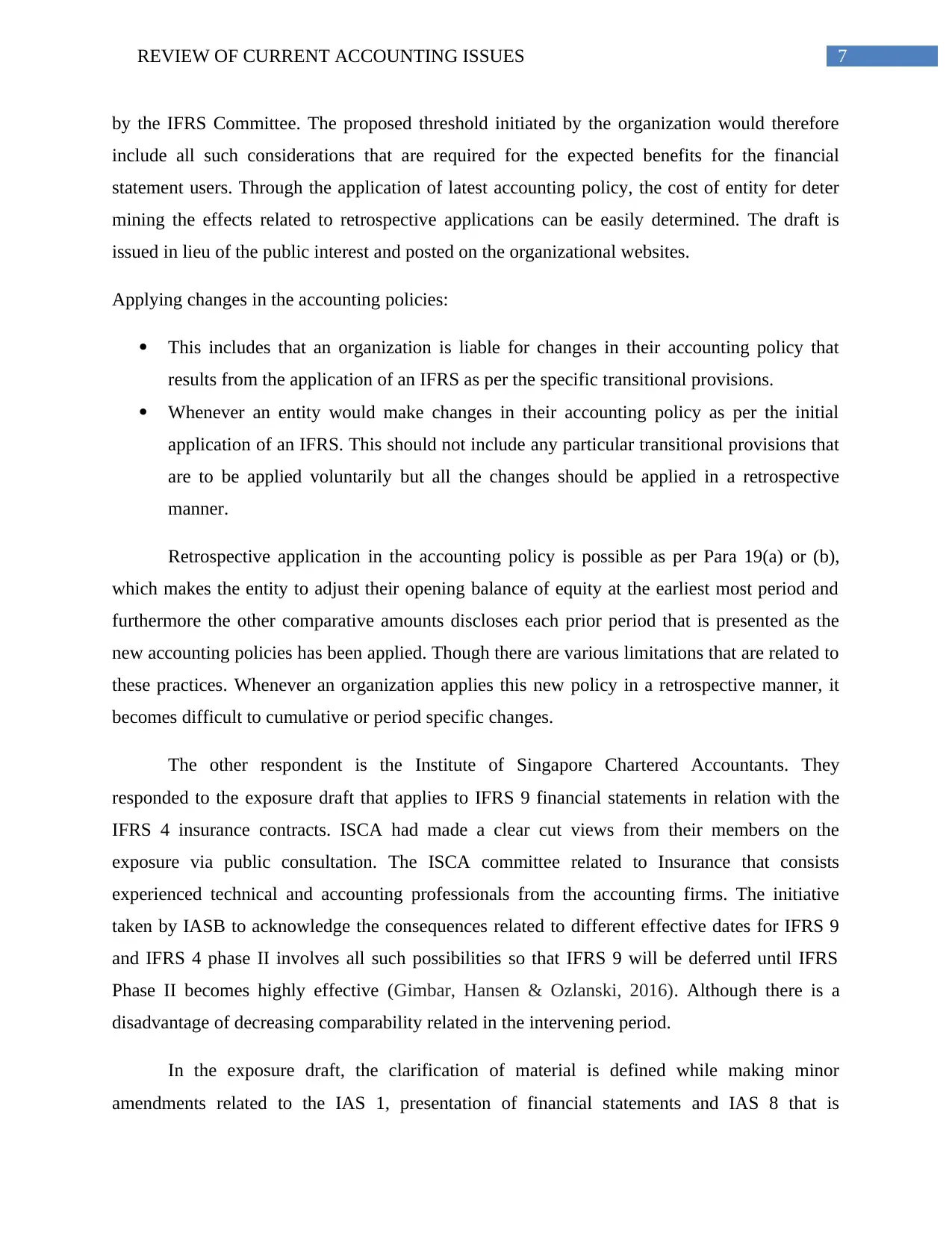
7REVIEW OF CURRENT ACCOUNTING ISSUES
by the IFRS Committee. The proposed threshold initiated by the organization would therefore
include all such considerations that are required for the expected benefits for the financial
statement users. Through the application of latest accounting policy, the cost of entity for deter
mining the effects related to retrospective applications can be easily determined. The draft is
issued in lieu of the public interest and posted on the organizational websites.
Applying changes in the accounting policies:
This includes that an organization is liable for changes in their accounting policy that
results from the application of an IFRS as per the specific transitional provisions.
Whenever an entity would make changes in their accounting policy as per the initial
application of an IFRS. This should not include any particular transitional provisions that
are to be applied voluntarily but all the changes should be applied in a retrospective
manner.
Retrospective application in the accounting policy is possible as per Para 19(a) or (b),
which makes the entity to adjust their opening balance of equity at the earliest most period and
furthermore the other comparative amounts discloses each prior period that is presented as the
new accounting policies has been applied. Though there are various limitations that are related to
these practices. Whenever an organization applies this new policy in a retrospective manner, it
becomes difficult to cumulative or period specific changes.
The other respondent is the Institute of Singapore Chartered Accountants. They
responded to the exposure draft that applies to IFRS 9 financial statements in relation with the
IFRS 4 insurance contracts. ISCA had made a clear cut views from their members on the
exposure via public consultation. The ISCA committee related to Insurance that consists
experienced technical and accounting professionals from the accounting firms. The initiative
taken by IASB to acknowledge the consequences related to different effective dates for IFRS 9
and IFRS 4 phase II involves all such possibilities so that IFRS 9 will be deferred until IFRS
Phase II becomes highly effective (Gimbar, Hansen & Ozlanski, 2016). Although there is a
disadvantage of decreasing comparability related in the intervening period.
In the exposure draft, the clarification of material is defined while making minor
amendments related to the IAS 1, presentation of financial statements and IAS 8 that is
by the IFRS Committee. The proposed threshold initiated by the organization would therefore
include all such considerations that are required for the expected benefits for the financial
statement users. Through the application of latest accounting policy, the cost of entity for deter
mining the effects related to retrospective applications can be easily determined. The draft is
issued in lieu of the public interest and posted on the organizational websites.
Applying changes in the accounting policies:
This includes that an organization is liable for changes in their accounting policy that
results from the application of an IFRS as per the specific transitional provisions.
Whenever an entity would make changes in their accounting policy as per the initial
application of an IFRS. This should not include any particular transitional provisions that
are to be applied voluntarily but all the changes should be applied in a retrospective
manner.
Retrospective application in the accounting policy is possible as per Para 19(a) or (b),
which makes the entity to adjust their opening balance of equity at the earliest most period and
furthermore the other comparative amounts discloses each prior period that is presented as the
new accounting policies has been applied. Though there are various limitations that are related to
these practices. Whenever an organization applies this new policy in a retrospective manner, it
becomes difficult to cumulative or period specific changes.
The other respondent is the Institute of Singapore Chartered Accountants. They
responded to the exposure draft that applies to IFRS 9 financial statements in relation with the
IFRS 4 insurance contracts. ISCA had made a clear cut views from their members on the
exposure via public consultation. The ISCA committee related to Insurance that consists
experienced technical and accounting professionals from the accounting firms. The initiative
taken by IASB to acknowledge the consequences related to different effective dates for IFRS 9
and IFRS 4 phase II involves all such possibilities so that IFRS 9 will be deferred until IFRS
Phase II becomes highly effective (Gimbar, Hansen & Ozlanski, 2016). Although there is a
disadvantage of decreasing comparability related in the intervening period.
In the exposure draft, the clarification of material is defined while making minor
amendments related to the IAS 1, presentation of financial statements and IAS 8 that is
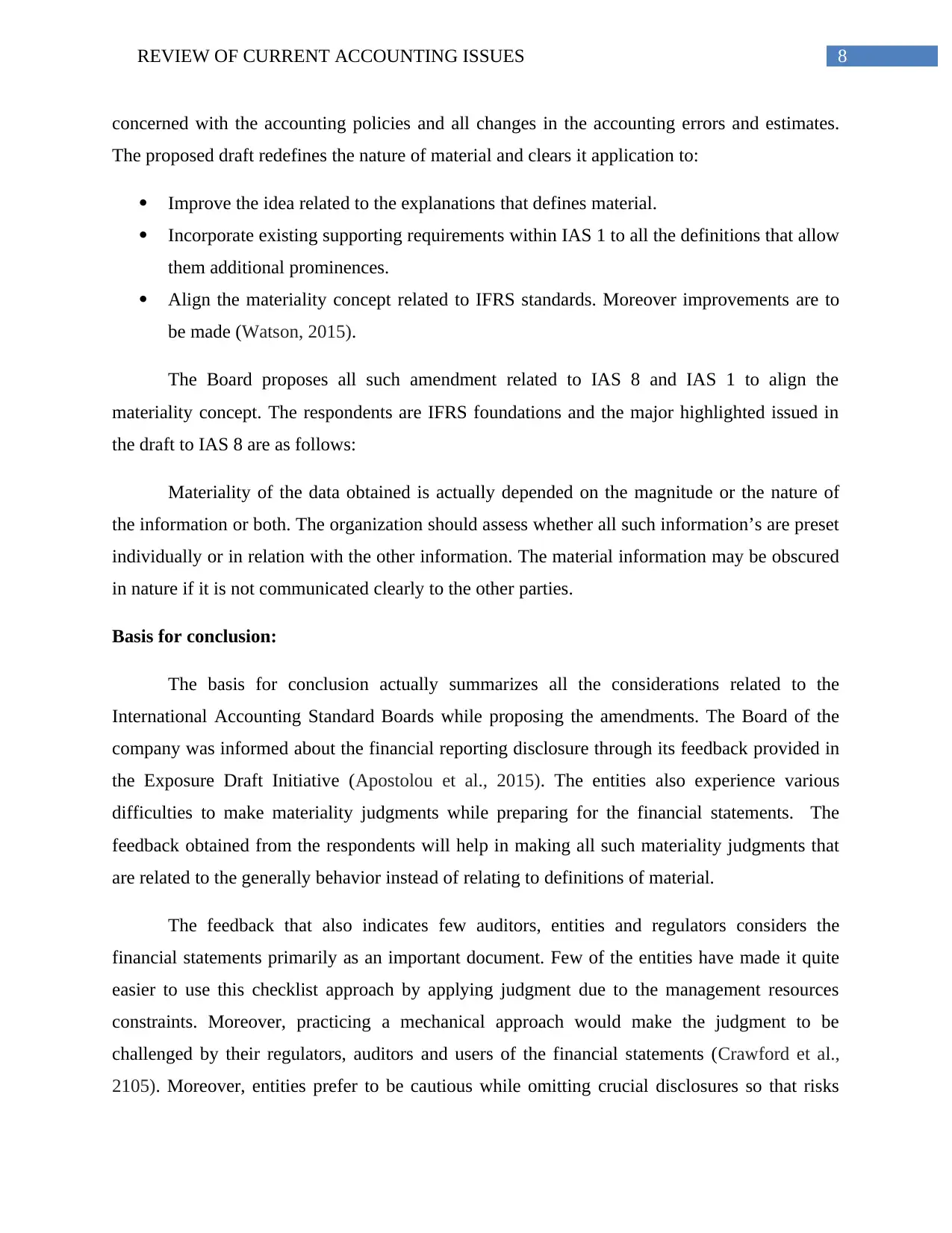
8REVIEW OF CURRENT ACCOUNTING ISSUES
concerned with the accounting policies and all changes in the accounting errors and estimates.
The proposed draft redefines the nature of material and clears it application to:
Improve the idea related to the explanations that defines material.
Incorporate existing supporting requirements within IAS 1 to all the definitions that allow
them additional prominences.
Align the materiality concept related to IFRS standards. Moreover improvements are to
be made (Watson, 2015).
The Board proposes all such amendment related to IAS 8 and IAS 1 to align the
materiality concept. The respondents are IFRS foundations and the major highlighted issued in
the draft to IAS 8 are as follows:
Materiality of the data obtained is actually depended on the magnitude or the nature of
the information or both. The organization should assess whether all such information’s are preset
individually or in relation with the other information. The material information may be obscured
in nature if it is not communicated clearly to the other parties.
Basis for conclusion:
The basis for conclusion actually summarizes all the considerations related to the
International Accounting Standard Boards while proposing the amendments. The Board of the
company was informed about the financial reporting disclosure through its feedback provided in
the Exposure Draft Initiative (Apostolou et al., 2015). The entities also experience various
difficulties to make materiality judgments while preparing for the financial statements. The
feedback obtained from the respondents will help in making all such materiality judgments that
are related to the generally behavior instead of relating to definitions of material.
The feedback that also indicates few auditors, entities and regulators considers the
financial statements primarily as an important document. Few of the entities have made it quite
easier to use this checklist approach by applying judgment due to the management resources
constraints. Moreover, practicing a mechanical approach would make the judgment to be
challenged by their regulators, auditors and users of the financial statements (Crawford et al.,
2105). Moreover, entities prefer to be cautious while omitting crucial disclosures so that risks
concerned with the accounting policies and all changes in the accounting errors and estimates.
The proposed draft redefines the nature of material and clears it application to:
Improve the idea related to the explanations that defines material.
Incorporate existing supporting requirements within IAS 1 to all the definitions that allow
them additional prominences.
Align the materiality concept related to IFRS standards. Moreover improvements are to
be made (Watson, 2015).
The Board proposes all such amendment related to IAS 8 and IAS 1 to align the
materiality concept. The respondents are IFRS foundations and the major highlighted issued in
the draft to IAS 8 are as follows:
Materiality of the data obtained is actually depended on the magnitude or the nature of
the information or both. The organization should assess whether all such information’s are preset
individually or in relation with the other information. The material information may be obscured
in nature if it is not communicated clearly to the other parties.
Basis for conclusion:
The basis for conclusion actually summarizes all the considerations related to the
International Accounting Standard Boards while proposing the amendments. The Board of the
company was informed about the financial reporting disclosure through its feedback provided in
the Exposure Draft Initiative (Apostolou et al., 2015). The entities also experience various
difficulties to make materiality judgments while preparing for the financial statements. The
feedback obtained from the respondents will help in making all such materiality judgments that
are related to the generally behavior instead of relating to definitions of material.
The feedback that also indicates few auditors, entities and regulators considers the
financial statements primarily as an important document. Few of the entities have made it quite
easier to use this checklist approach by applying judgment due to the management resources
constraints. Moreover, practicing a mechanical approach would make the judgment to be
challenged by their regulators, auditors and users of the financial statements (Crawford et al.,
2105). Moreover, entities prefer to be cautious while omitting crucial disclosures so that risks
⊘ This is a preview!⊘
Do you want full access?
Subscribe today to unlock all pages.

Trusted by 1+ million students worldwide
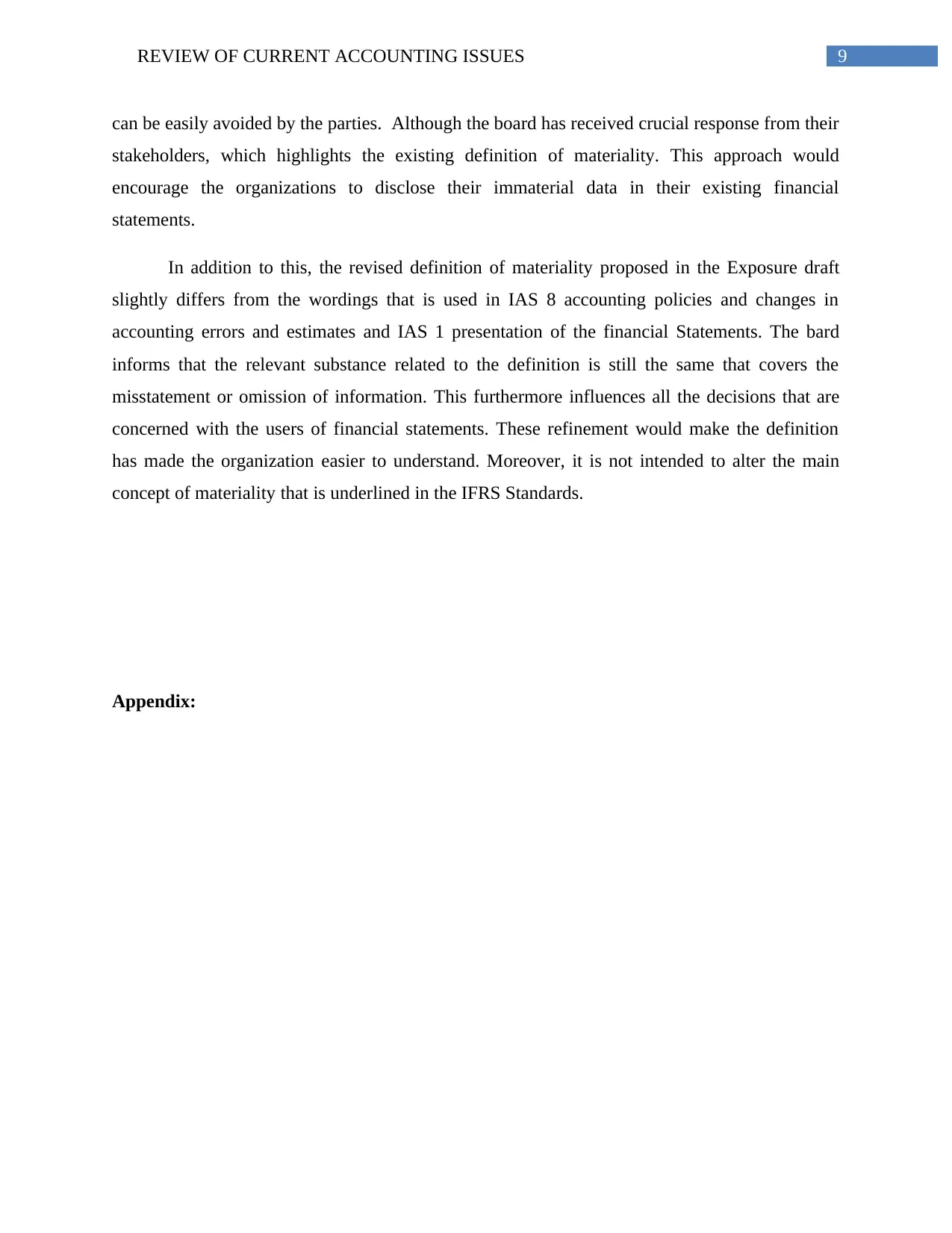
9REVIEW OF CURRENT ACCOUNTING ISSUES
can be easily avoided by the parties. Although the board has received crucial response from their
stakeholders, which highlights the existing definition of materiality. This approach would
encourage the organizations to disclose their immaterial data in their existing financial
statements.
In addition to this, the revised definition of materiality proposed in the Exposure draft
slightly differs from the wordings that is used in IAS 8 accounting policies and changes in
accounting errors and estimates and IAS 1 presentation of the financial Statements. The bard
informs that the relevant substance related to the definition is still the same that covers the
misstatement or omission of information. This furthermore influences all the decisions that are
concerned with the users of financial statements. These refinement would make the definition
has made the organization easier to understand. Moreover, it is not intended to alter the main
concept of materiality that is underlined in the IFRS Standards.
Appendix:
can be easily avoided by the parties. Although the board has received crucial response from their
stakeholders, which highlights the existing definition of materiality. This approach would
encourage the organizations to disclose their immaterial data in their existing financial
statements.
In addition to this, the revised definition of materiality proposed in the Exposure draft
slightly differs from the wordings that is used in IAS 8 accounting policies and changes in
accounting errors and estimates and IAS 1 presentation of the financial Statements. The bard
informs that the relevant substance related to the definition is still the same that covers the
misstatement or omission of information. This furthermore influences all the decisions that are
concerned with the users of financial statements. These refinement would make the definition
has made the organization easier to understand. Moreover, it is not intended to alter the main
concept of materiality that is underlined in the IFRS Standards.
Appendix:
Paraphrase This Document
Need a fresh take? Get an instant paraphrase of this document with our AI Paraphraser
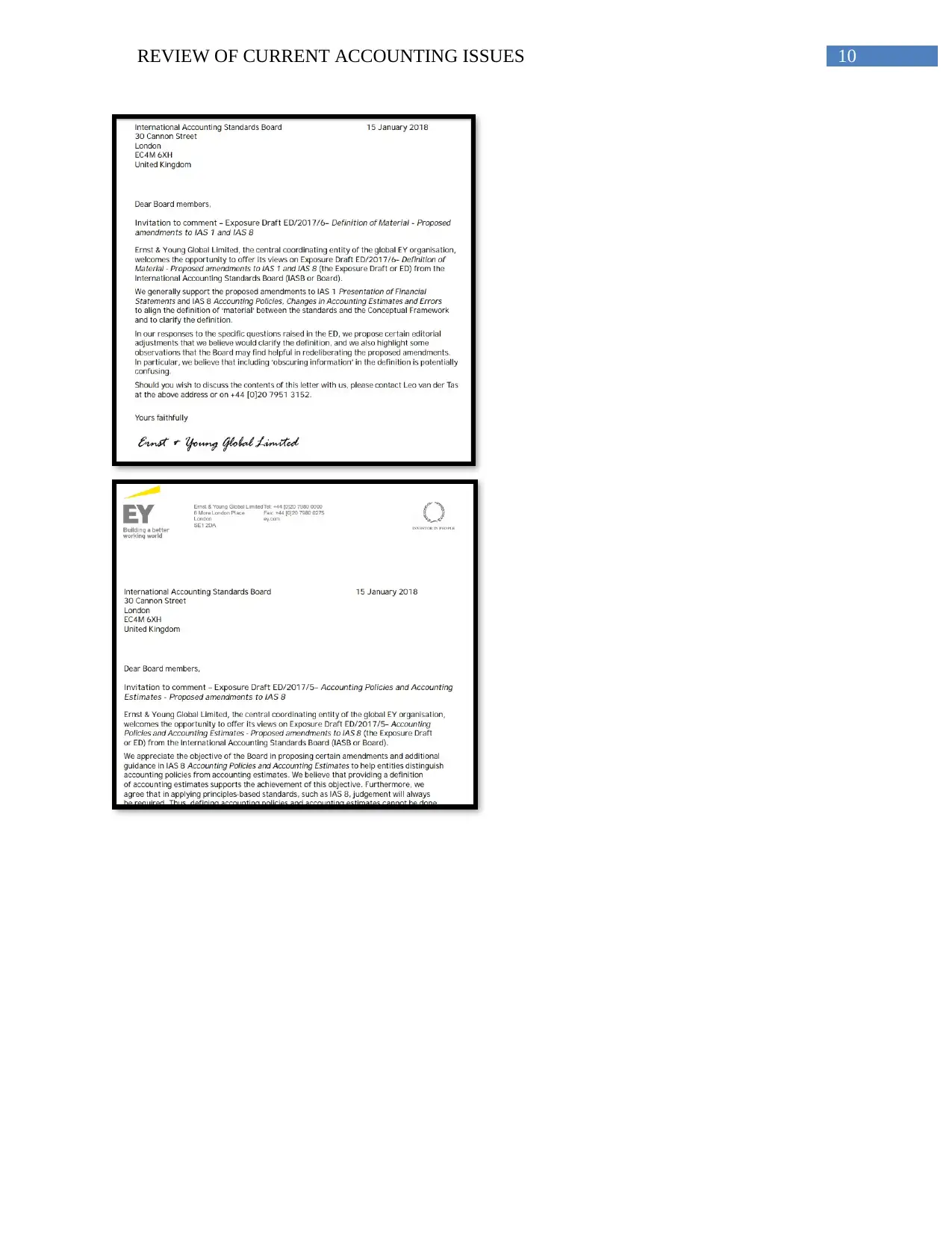
10REVIEW OF CURRENT ACCOUNTING ISSUES
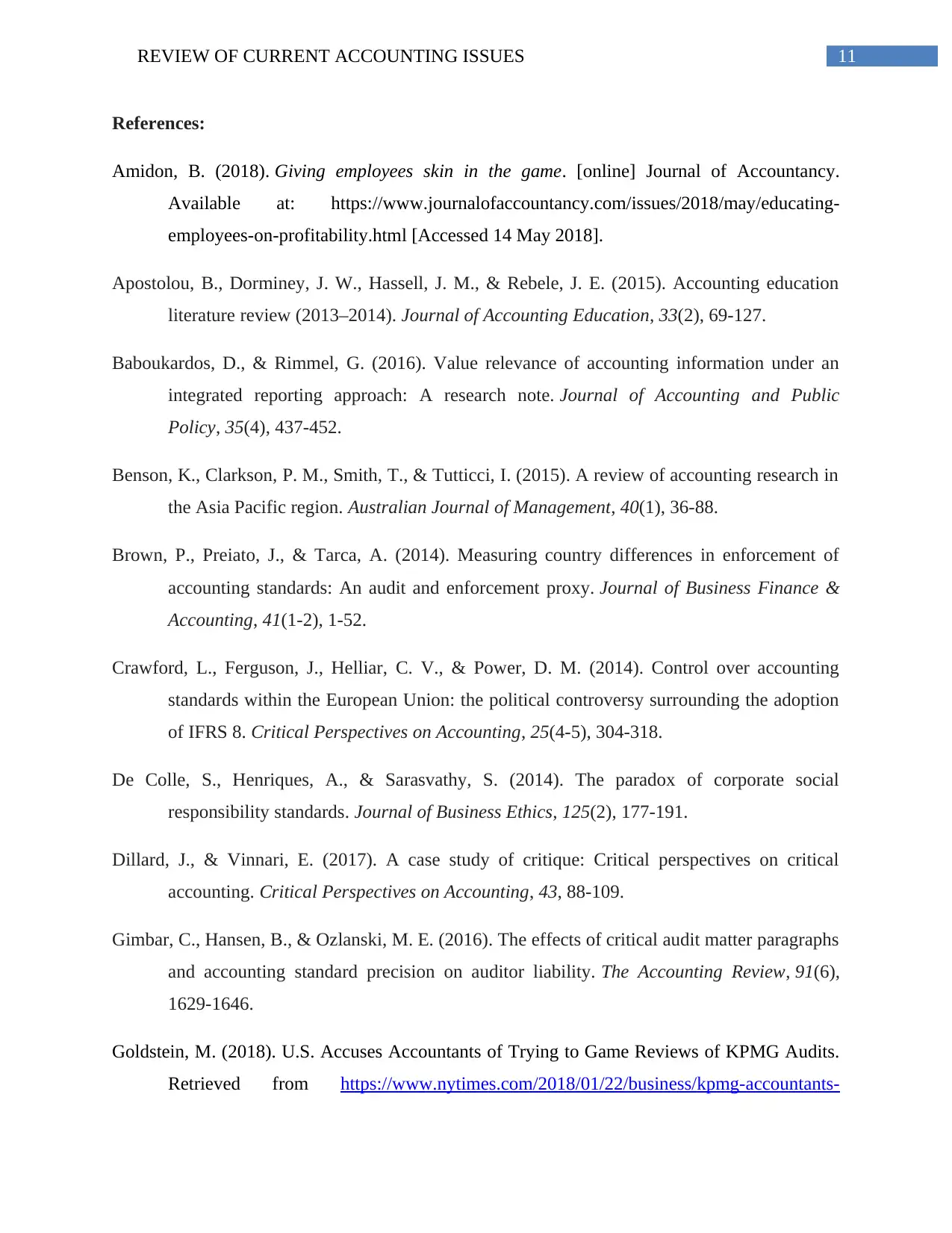
11REVIEW OF CURRENT ACCOUNTING ISSUES
References:
Amidon, B. (2018). Giving employees skin in the game. [online] Journal of Accountancy.
Available at: https://www.journalofaccountancy.com/issues/2018/may/educating-
employees-on-profitability.html [Accessed 14 May 2018].
Apostolou, B., Dorminey, J. W., Hassell, J. M., & Rebele, J. E. (2015). Accounting education
literature review (2013–2014). Journal of Accounting Education, 33(2), 69-127.
Baboukardos, D., & Rimmel, G. (2016). Value relevance of accounting information under an
integrated reporting approach: A research note. Journal of Accounting and Public
Policy, 35(4), 437-452.
Benson, K., Clarkson, P. M., Smith, T., & Tutticci, I. (2015). A review of accounting research in
the Asia Pacific region. Australian Journal of Management, 40(1), 36-88.
Brown, P., Preiato, J., & Tarca, A. (2014). Measuring country differences in enforcement of
accounting standards: An audit and enforcement proxy. Journal of Business Finance &
Accounting, 41(1-2), 1-52.
Crawford, L., Ferguson, J., Helliar, C. V., & Power, D. M. (2014). Control over accounting
standards within the European Union: the political controversy surrounding the adoption
of IFRS 8. Critical Perspectives on Accounting, 25(4-5), 304-318.
De Colle, S., Henriques, A., & Sarasvathy, S. (2014). The paradox of corporate social
responsibility standards. Journal of Business Ethics, 125(2), 177-191.
Dillard, J., & Vinnari, E. (2017). A case study of critique: Critical perspectives on critical
accounting. Critical Perspectives on Accounting, 43, 88-109.
Gimbar, C., Hansen, B., & Ozlanski, M. E. (2016). The effects of critical audit matter paragraphs
and accounting standard precision on auditor liability. The Accounting Review, 91(6),
1629-1646.
Goldstein, M. (2018). U.S. Accuses Accountants of Trying to Game Reviews of KPMG Audits.
Retrieved from https://www.nytimes.com/2018/01/22/business/kpmg-accountants-
References:
Amidon, B. (2018). Giving employees skin in the game. [online] Journal of Accountancy.
Available at: https://www.journalofaccountancy.com/issues/2018/may/educating-
employees-on-profitability.html [Accessed 14 May 2018].
Apostolou, B., Dorminey, J. W., Hassell, J. M., & Rebele, J. E. (2015). Accounting education
literature review (2013–2014). Journal of Accounting Education, 33(2), 69-127.
Baboukardos, D., & Rimmel, G. (2016). Value relevance of accounting information under an
integrated reporting approach: A research note. Journal of Accounting and Public
Policy, 35(4), 437-452.
Benson, K., Clarkson, P. M., Smith, T., & Tutticci, I. (2015). A review of accounting research in
the Asia Pacific region. Australian Journal of Management, 40(1), 36-88.
Brown, P., Preiato, J., & Tarca, A. (2014). Measuring country differences in enforcement of
accounting standards: An audit and enforcement proxy. Journal of Business Finance &
Accounting, 41(1-2), 1-52.
Crawford, L., Ferguson, J., Helliar, C. V., & Power, D. M. (2014). Control over accounting
standards within the European Union: the political controversy surrounding the adoption
of IFRS 8. Critical Perspectives on Accounting, 25(4-5), 304-318.
De Colle, S., Henriques, A., & Sarasvathy, S. (2014). The paradox of corporate social
responsibility standards. Journal of Business Ethics, 125(2), 177-191.
Dillard, J., & Vinnari, E. (2017). A case study of critique: Critical perspectives on critical
accounting. Critical Perspectives on Accounting, 43, 88-109.
Gimbar, C., Hansen, B., & Ozlanski, M. E. (2016). The effects of critical audit matter paragraphs
and accounting standard precision on auditor liability. The Accounting Review, 91(6),
1629-1646.
Goldstein, M. (2018). U.S. Accuses Accountants of Trying to Game Reviews of KPMG Audits.
Retrieved from https://www.nytimes.com/2018/01/22/business/kpmg-accountants-
⊘ This is a preview!⊘
Do you want full access?
Subscribe today to unlock all pages.

Trusted by 1+ million students worldwide
1 out of 13
Related Documents
Your All-in-One AI-Powered Toolkit for Academic Success.
+13062052269
info@desklib.com
Available 24*7 on WhatsApp / Email
![[object Object]](/_next/static/media/star-bottom.7253800d.svg)
Unlock your academic potential
Copyright © 2020–2026 A2Z Services. All Rights Reserved. Developed and managed by ZUCOL.





